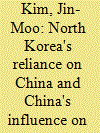| Srl | Item |
| 1 |
ID:
115581


|
|
|
| 2 |
ID:
108552


|
|
|
|
|
| Publication |
2011.
|
| Summary/Abstract |
North Korea's economic reliance on China has been increasing recently. China is
certainly North Korea's most important partner of political collaboration and
international mediator. The international community is paying close attention to
the possibility that China may bring North Korea under its outright control. It is
certain that North Korea's reliance on China will deepen further if its economic difficulties worsen or if there is a crisis in the regime. While the expansion of North
Korea-China economic relations may trigger a positive change in North Korea, it
might have a negative impact on the development of inter-Korea relations and the
settlement of issues related to North Korea's nuclear program.
|
|
|
|
|
|
|
|
|
|
|
|
|
|
|
|
| 3 |
ID:
121723


|
|
|
|
|
| Publication |
2013.
|
| Summary/Abstract |
The U.S. special representative for North Korea policy outlined Washington's current strategy for dealing with North Korea's nuclear program, saying last month that the United States will place a high priority on efforts to coordinate with partner countries in the region so they speak with "one voice" before negotiating with Pyongyang on denuclearization.
|
|
|
|
|
|
|
|
|
|
|
|
|
|
|
|
| 4 |
ID:
107391


|
|
|
|
|
| Publication |
2011.
|
| Summary/Abstract |
The United States and North Korea held their first high-level meeting in nearly two years in July as part of efforts to restart multilateral talks on North Korea's nuclear program.
|
|
|
|
|
|
|
|
|
|
|
|
|
|
|
|
| 5 |
ID:
122131


|
|
|
|
|
| Publication |
2013.
|
| Summary/Abstract |
In March 2013, US Secretary of Defense Chuck Hagel, citing the progress of North Korea's nuclear program, announced that the United States would be bolstering its missile defenses. Fourteen new ground-based interceptor missiles, known as GBIs, would be deployed to Alaska, augmenting the thirty already in silos there and in California. The Pentagon would develop a new two-stage GBI, as well as a more advanced version of the "kill vehicle," which interceptors carry to smash into adversary warheads ("hit-to-kill"). The Obama administration would be deploying a second advanced mobile radar system, the Army Navy/Transportable Radar Surveillance 2, in Japan. And Hagel even indicated that the administration would restructure its plans for US missile defenses in Europe, canceling the SM-3 IIB interceptor, the cornerstone of the fourth and final phase of its European Phased Adaptive Approach (EPAA), which had been announced in 2009 as a means of deploying more-advanced interceptors in Eastern and Central Europe specifically designed to defend the US homeland from intercontinental ballistic missiles launched from Europe, Eurasia, or the Middle East.
|
|
|
|
|
|
|
|
|
|
|
|
|
|
|
|